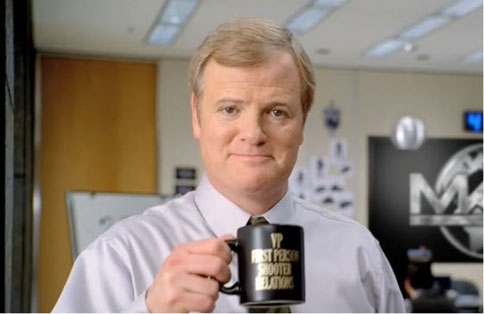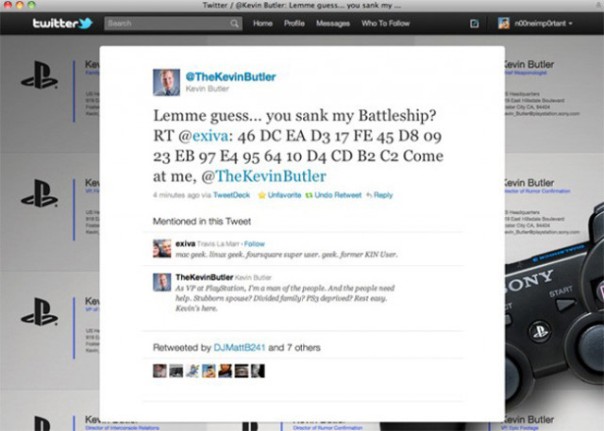Creating a Brand Character – Sony Playstation’s VP of Everything

Source: adweek.com
Building a brand character can serve as a great opportunity for companies to stand out. The brand character should be the personified representation of a company characteristics. By representing a brand through a person, it becomes more accessible and facilitates interactions with customers on a more personal and emotional level.
A great example for a successful brand character is Sony Playstation’s “Kevin Butler”, who was introduced at a crucial time for the company. At that time, Sony had already released its gaming console, the Playstation 3, and was about to launch a slimmer, cheaper model of it, as well as announce a price cut to 299$. Sony was also developing its own motion controller “Playstation Move” in response to the commercial success of Nintendo’s Wii. Since the majority of Playstation users can be considered “hardcore gamers”, it would be a difficult task to make them excited for motion controlling, which is more suited to “casual gamers”. Furthermore, the reactions to the previous marketing campaign “Play Beyond” were rather mixed. Especially the “Baby Doll” commercial was seen as rather bizarre and even creepy (you can watch it Here).
In August 2009, Sony launched its “It only does everything” campaign which marked the introduction and the focus of Kevin Butler as the fictional VP of different departments of Sony Playstation.
The campaign
The campaign consisted of many different components, which is why I will only explain the most important ones in further detail
One of the most important component were the commercials uploaded on the official YouTube Channel of Sony Playstation. In the “Dear Playstation” commercials, Kevin Butler answers questions from worried fictional customers as the VP of “Rumor Confirmation” or “Add More Awesome”. These ads do a great job of advertising one specific game or feature of the Playstation 3 in a funny almost sarcastic kind of way:
Other commercials included the popular Playstation Move commercial where he makes funny remarks about Sony’s competitor Microsoft. At that time, Microsoft was also developing its own motion control system, the Xbox Kinect, where players were able to play games with their body movement alone (no controllers required). KB is making fun about the lack of a proper controller which he depicts as an essential tool for hardcore gamers:
“Come on, who wants to pretend their hand is a gun. What is this? Third grade? Pew! Pew!”
Sony was not only able to make the Playstation more appealing to hardcore gamers, the company was also mocking one of its biggest competitors.
One of the highlights of the “It only does everything” campaign featuring KB, was his surprise appearance during Sony’s E3 press conference in 2010. The Electronic Entertainment Expo (short E3) in Los Angeles is the most important trade fair for video gaming. Each year, big producers and publishers like Sony, Microsoft and Nintendo hold large press conferences where they introduce their latest technology and games. The press conferences are not only streamed online, the event also gathers countless journalists and bloggers from all over the world, which is why major companies often make big announcements, such as a new generation of consoles.
During Kevin Butler’s very entertaining appearance at E3 2010, he did not just advertise Sony’s Playstation Move or any new games, he basically held a speech about his love for video games. He even referenced past commercials (PS Move commercial: “Pew! Pew!”, Rumor Confirmation commercial: “Peter, you can’t believe anything you read on the internet.”) and made fun of Microsoft’s press conference where a group of circus artists were performing (“So am I crazy or did I just see a hundred French acrobats prancing around the arena the other night?”). The reactions were very positive. The audience of the press conference were constantly cheering him on and the speech was mentioned several times by gaming magazines as one of the highlights of the fair.
Kevin Butler also had his own Twitter account which was not used to simply publish product information. Instead he stayed in character and people were able to read about his random thoughts and could even engage in a conversation with him. In the end, he was the most followed brand character on Twitter with over 130.000 followers.
While engaging in a conversation on Twitter in 2011 however, the code to jailbreak or hack the Playstation, and therefore being able to play pirated games, was retweeted through the official KB Twitter account. This shows that the Twitter account, despite its high number of followers, was not supervised properly.

Source: digitaltrends.com
Despite that, Sony Playstation continued to use Kevin Butler for their marketing activities and even tried to make the best out of this situation. They continued his story by letting him “quit” his job at Sony Playstation and instead making him the president of economy flooring, only to prepare his return for the next big campaign “Long Live Play” .
Why was he so popular?
First and foremost, Kevin Butler was far from being a typical vice president of a company. He was funny and accessible. The audience could relate to Kevin Butler who frequently expressed his love for video games, creating a closer relationship between the company and its customers. This relationship was facilitated through conversations on Twitter.
Another likeable aspect of this brand character was that he was controversial at times. He would make provoking remarks at competitors, especially Microsoft, making use of the rivalry, “console wars” between the two companies. Kevin Butler certainly was a character who didn’t mince words (“Bernie, you can’t believe everything you read on the internet. That’s how World War I got started.”) and that’s what made him so appealing to the audience.
What went wrong?
The end of “Kevin Butler” was caused by a controversy related to the actor Jerry Lambert who played the popular brand character. The strength and at the same time the greatest weakness of a brand character is the strong connection between the brand and the character. Positive aspects of KB were transferred to the brand itself and he basically became the face of the company. But what happens if the familiar face of Sony Playstation suddenly appeared in a commercial of another company? This happened in 2012, when Jerry Lambert was employed by Bridgestone for a commercial. It would have been no problem if he simply had advertised tires. However, Bridgestone had entered a partnership with Nintendo and advertised their “Game On!” promotion where customers were able to receive a Nintendo Wii console for free when purchasing four Bridgestone tires. Therefore, Jerry Lambert/Kevin Butler was seen playing the Wii gaming console in Bridgestone’s commercial (you can see the original ad here). This caused confusion among customers who were wondering why the VP of Sony Playstation was suddenly playing with a gaming console of competitor Nintendo. As this was a breach of Jerry Lambert’s contract with Sony Playstation, the company filed a lawsuit and stopped using the character “Kevin Butler” in their promotions.
In conclusion, Sony Playstation’s fictional VP is a great example on how cleverly a brand character can be used in marketing. At the same time, it is also a good example on how it could go horribly wrong. By now, the official Twitter account of Kevin Butler has been deleted. His commercials have also been removed from the official Playstation YouTube account.
While one of the creators of the KB campaign claims that sales of the PS3 have greatly increased thanks to KB, the rise is probably due to the price cut and the introduction of the slim version of the PS3. Regarding the reactions online of gamers around the world however, KB has certainly been successful in reaching the company’s target audience.
References:
Athab, M. (May 30 2008): This is Advertising – Top 10 worst PlayStation ads, part 3. Retrieved from: http://www.engadget.com/2008/05/30/this-is-advertising-top-10-worst-playstation-ads-part-3/
Couts, A. (February 9, 2011): Sony accidently retweets PS3 ‘jailbreak’ code, mistakes it for a ‘battleship’ reference. Retrieved from: http://www.digitaltrends.com/gaming/sony-accidentally-retweets-ps3-jailbreak-code-mistakes-it-for-a-battleship-reference/
Dille, P. (August 27 2009): It Only Does Everything. Retrieved from: http://blog.us.playstation.com/2009/08/27/it-only-does-everything/
Drewniany, B. & Jewler, J. (2014): Creative Strategy in Advertising. 11th Edition, Boston, Wadsworth, Cengage Learning
Elm, J. (n.d.): Kevin Butler – VP of Everything. Retrieved from: http://cargocollective.com/JasonElm/Kevin-Butler-VP-of-Everything-1
Griner, D. (August 29, 2011): Kevin butler Quits Playstation for Career in Flooring. Retrieved from: http://www.adweek.com/adfreak/kevin-butler-quits-playstation-career-flooring-134496
n.A. (June 15 2015): E3 explained – What to expect at the world’s biggest gaming convention. Retrieved from: http://home.bt.com/tech-gadgets/tech-news/e3-explained-what-to-expect-at-the-worlds-biggest-gaming-convention-11363986497664
Nudd, T. (October 8, 2012): Sony Sues Its VP of Everything, Kevin Butler, for Playing a Wii. Retrieved from: http://www.adweek.com/adfreak/sony-sues-its-vp-everything-kevin-butler-playing-wii-144308
Rojas, J. (June 3 2013): Motion Control and Hardcore Gaming. Retrieved from: http://thebuttonmash.com/community/motion-control-and-hardcore-gaming/
5월 1, 2016, Consumer Psychology에 게시되었습니다. 퍼머링크를 북마크하세요. 댓글 3개.
Thank you for this extensive post! I think it’s a very smart idea (of course, it went the other way in this case in the end) to invent a fictional character for one’s own brand. I’m especially intrigued by the fact that they made him a social media presence. People tend to spend more time on interacting with a brand and invest more money in it when they feel somewhat related to it, so giving the brand a face that actually interacts with its customers is a genius move from Sony. Sadly, it ended the way it did, otherwise it could have been a very funny and fruitful long-term thing.
좋아요좋아요
I met so many people love Sony Playstation, both man and woman. I always considered how Sony Playstation can attracted them like that. Now, I can know that it is not only by its quality but also its marketing campaign. Sony Playstation definitely is a great and horrible example on using brand character in marketing. Thank you for your post.
좋아요좋아요
Wauw! Interesting article. Never saw this campaign in my home country (The Netherlands). It think a character as Kevin adds more value to their brand. Because a brand character can serve indeed great opportunities and makes it easier to differentiate themselves of other comparing brands. Because the brand/products are related to a specific person. Good job! Very inspiring!
좋아요좋아요